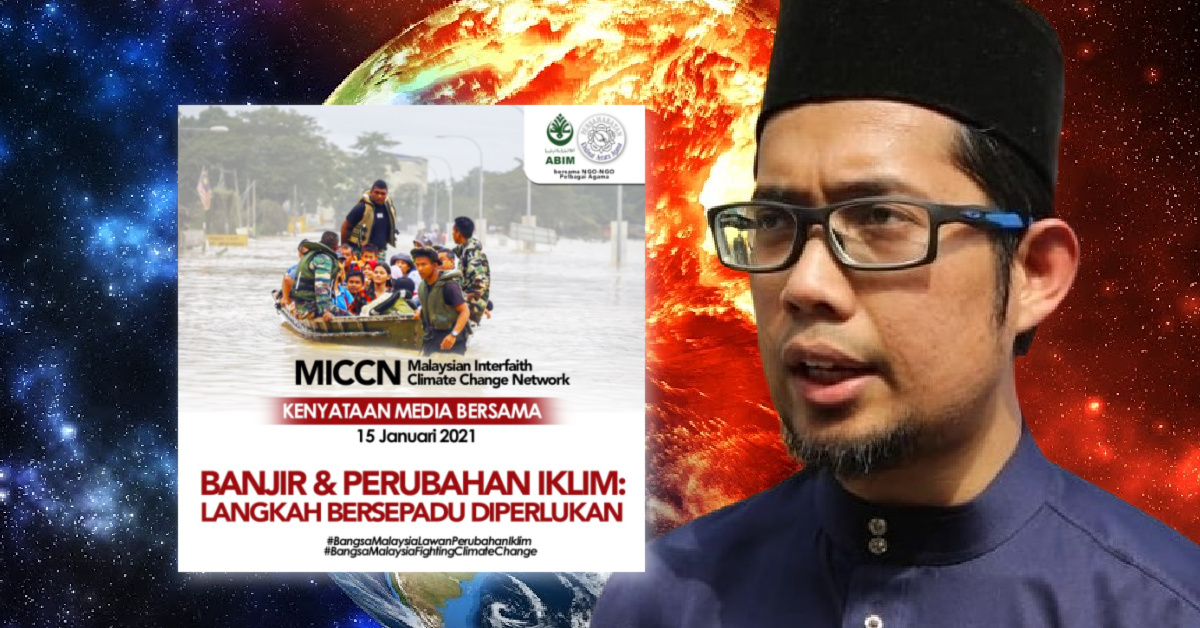We, the Malaysian Interfaith Climate Change Network (MICCN) consisting of the Muslim Youth Movement of Malaysia (ABIM) and Friendship Group of Inter Religious Services (FGIS) take seriously the issue of flooding that has hit many states.
We are firmly of the view that flooding happens repeatedly because of several key factors which all parties should take responsibility for:
- Climate change: Climate change has caused unpredictable weather patterns. This situation leads to unpredictable rainfall at any given time and can cause major flooding when flood mitigation measures cannot function properly. The authorities must thus consider climate change as a major factor leading to flooding.
- Uncontrolled logging: Uncontrolled logging will compromise water stocks in reserve forests on riverbanks and cause mud slides. Logging by land clearing will worsen the situation because water runoff will exceed infiltration (the amount of water that enters the ground for groundwater recharging and water reserves). Logging should be done in a controlled manner via selective logging to ensure sustainability and sufficient water stocks.
- Rivers: Rivers that are not properly maintained through methods such as being deepened to meet certain criteria and being kept free of waste also cause flooding. The authorities should increase their efforts to properly maintain rivers, including by preventing riverbanks from being compromised.
- River basins: River basins and flood reservoirs in downstream areas that serve to hold water overflows must be properly maintained. Activities by irresponsible parties that threaten these river basins must result in severe punitive actions by the authorities. Meanwhile, more flood mitigation pools must be built by the authorities as well.
- Replanting: Every time fields are replanted; this contributes to an increase in surface water runoffs. Such replanting activities should thus be reviewed, and a stage-by-stage process studied. Insufficient trees in urban areas, especially in the middle and downstream areas of a river also contribute to floods. We need to increase planting and preservation of trees in both these areas. This effort can involve the community through the concept of urban community forests.
- Housing: We should also note that increased construction will decrease forest area. Trees serve as water absorbents, so a decrease in trees will lead to an increase in water. We thus call for it to be mandatory for each housing project to have a rainwater harvesting system (RWH), and to incentivise the building of RWH systems in existing housing projects. RWH systems should also be implemented in rural areas. These systems can significantly reduce the amount of water entering drainage and river systems. Apart from that, any plans on town development should consider advice from environment experts to later avoid the mentioned problem.
- Environmental education: Educating the community about the environment in a comprehensive way that covers issues of climate change and the implications of unethical behaviour such as throwing rubbish into drains should be emphasised. Such education should be organised systematically for all layers of society.
- Integrated long term planning: The federal and state governments, including all ministries, departments, and agencies should sit together to formulate a holistic and integrated long-term plan for handling flooding. This effort must take into consideration how climate change and environmental degradation is a result of indiscriminate development, logging, unethical behaviour and so on. Integrated enforcement will obviously be necessary across the board.
In summary, we need an integrated long-term plan that involves every ministry, department, and agency at both state and federal levels. The failure of the authorities to come up with an integrated plan will undoubtedly cause flooding to be a recurring problem and burden the rakyat repeatedly. Furthermore, damage to infrastructure like highways, roads, and other public facilities due to flooding will surely cause an even greater drain on public money. We firmly urge that the aforementioned issues, climate change and deforestation in particular, be handled more effectively, for without emphasis on such issues, our beloved country will continue to face the direct and indirect effects of major catastrophes such as the flood and the Covid-19 pandemic.
MUHAMMAD FAISAL ABDUL AZIZ
Coordinator
Malaysian Interfaith Climate Change Network (MICC)
cum President of Muslim Youth Movement Malaysia (ABIM)
15th January 2021







Leave a comment